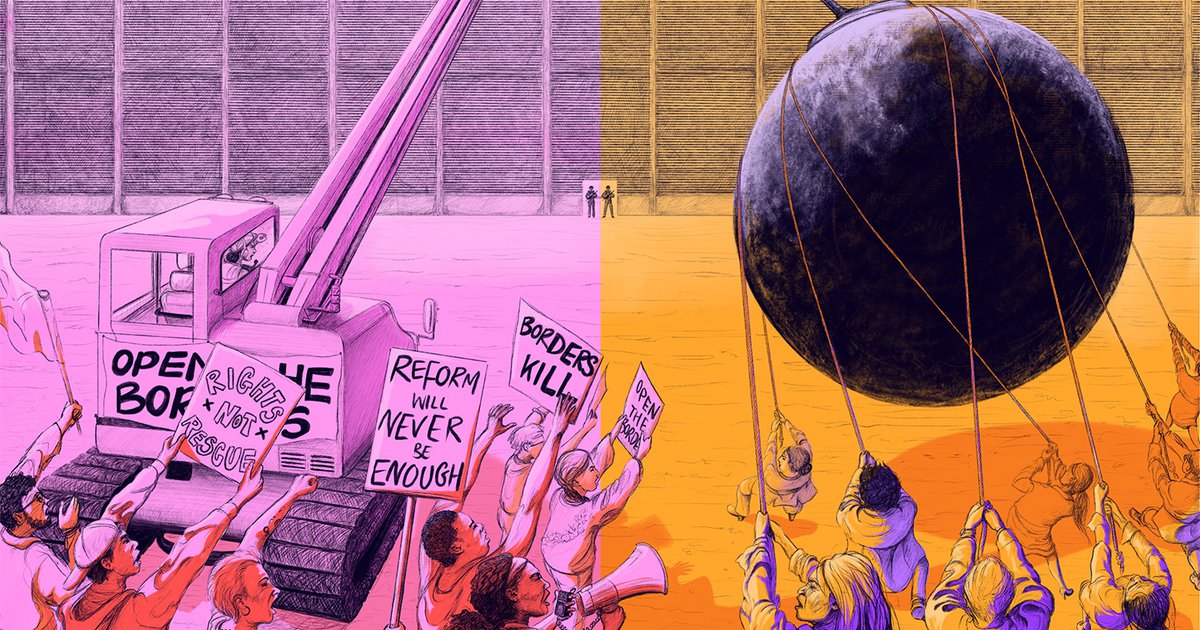
So, for example, in anti-immigration rhetoric, the false suggestion that smuggling always entails exploitation allows politicians and journalists to employ the categories ‘trafficking’ and ‘smuggling’ interchangeably. Anyone who facilitates unauthorised migration becomes part of the category that Priti Patel, the UK home secretary, brackets as “abhorrent criminal gangs and people smugglers who exploit vulnerable people”. At the same time, such ‘criminals’ are described as exploiting the supposed generosity of EU asylum and immigration systems – or in the UK, what Patel calls the “broken asylum system”. Suddenly, it is possible to present citizens as the real victims of exploitation, as Patel does when she speaks of “criminal gangs” who “laugh in the face of the British people”. Through this lens, migrants and asylum seekers meld into the category of ‘criminals who exploit vulnerable people’. It then becomes not only conscionable, but righteous, to jail asylum seekers who steered small boats crossing the English Channel, and to prosecute the bereaved father of a six-year-old child left to drown by the authorities.
In the US, Australia, and the EU, trafficking discourse has allowed for the sanitisation of some extraordinarily harsh, highly illiberal, and often lethal measures taken to supress unauthorised migration from Latin America, Asia, and Africa. And the impact of the trafficking protocol extends far beyond the borders of countries in the Global North. The language of trafficking in general, and the US TIP process in particular, has also been used to press governments of countries within Latin America, Asia, and Africa to adopt laws and policies that restrict and criminalise mobility, with extremely negative consequences for large numbers of people.
Anti-trafficking and anti-slavery NGOs sometimes, but not always, recognise that current immigration rules contribute to or compound the problems experienced by those seeking to enter countries in the Global North. But their emphasis is on how such rules make migrants vulnerable to trafficking and wrongly penalise its victims. They neither demand an end to bordering regimes and other restraints on mobility nor challenge the global political and economic structures that make mobility into a site of profound inequality.
But as critics of these structures point out, contemporary bordering regimes and other controls over mobility are rooted in histories of colonial violence and dispossession, including transatlantic and Indian Ocean slavery and their aftermaths. They exist not to prevent human movement, but to differentially allocate mobility rights and freedoms. Thus, they largely grant freedom of movement to those who are white and/or relatively wealthy and/or from the Global North, and who are adults. Meanwhile, they heavily restrict the mobility of people from and within the Global South, people who are racialised as black, brown or ‘other’, people who lack economic and social privilege, and people defined as children in international law. The trafficking and smuggling protocols are part and parcel of these regimes, and reproduce their racial and Global North-centric, as well as their class, gender, and age logics.
Features, not faults, of the system
As theorists of racial capitalism argue, the concept of exploitation, even as applied in critiques of capitalism, is not enough on its own to fully explain the racial logics of global capitalism – logics that are central to regimes of bordering and patterns of mobility and immobility in the contemporary world. Such patterns do not only or always spring from capital’s efforts to squeeze more surplus value from the working classes in processes of production and service industries.
Consider, for example, the militarised conflicts over territories containing sought-after resources. Those affected by such processes generally move if they can. Their journeys mostly end in Global South countries, but sometimes they are able to continue on to the Global North. Either way, many find themselves forcibly immobilised in refugee camps or detention centres. They may still be exploited as workers in production processes (as, for instance, many Syrian refugees are in Jordan), but others become the raw material of profit for the many private companies involved in immigration detention, refugee reception centres, and asylum accommodation and support services around the world.